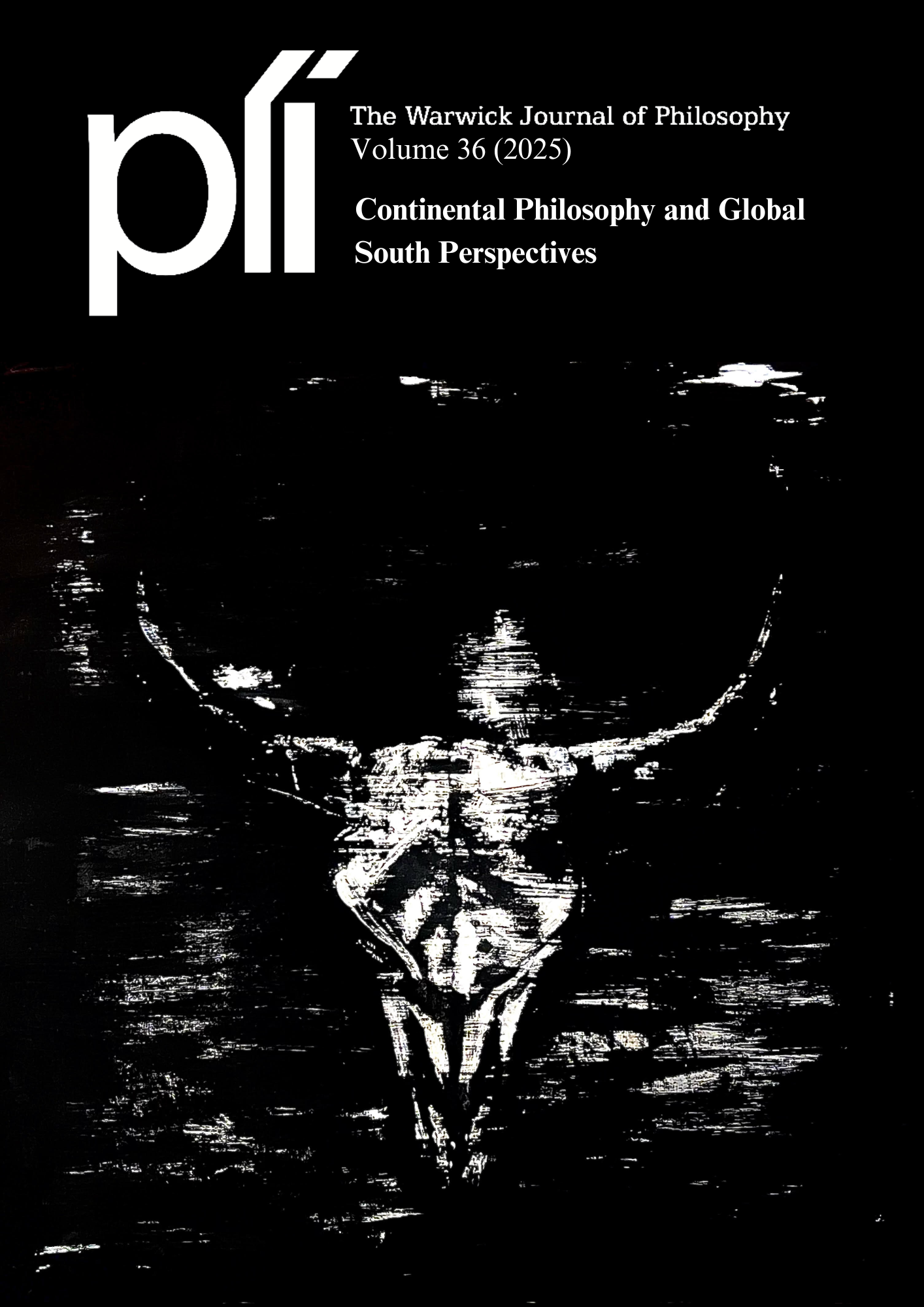Abstract
This article critically engages with the philosophical perspectives of Alain Badiou and Jacques Rancière, contrasting their affirmative approaches to political agency with the criticisms of human rights offered by Hannah Arendt and Giorgio Agamben. The analysis highlights the limitations of traditional human rights frameworks, especially in addressing complex issues such as migration and displacement. Badiou's ontology, centered on the concept of Event and the 'nomadic proletariat,' provides a compelling framework for understanding migrant struggles, particularly in Brazil, where historical patterns of migration and labor exploitation have shaped the sociopolitical landscape. Similarly, Rancière's theory of dissensus emphasizes the need for political subjectivation to break with the status quo and include marginalized populations. In contrast, Arendt and Agamben critique the intrinsic flaws in human rights discourse, arguing that it reinforces the domination of the nation-state and contributes to the exclusion and exploitation of those considered outsiders. The article concludes that neither existing human rights frameworks nor the critiques offered by Arendt, Agamben, or Derrida's concept of hospitality are sufficient to address the needs of displaced populations. Instead, it advocates for Badiou's and Rancière's disruptive, event-oriented approaches, calling for a radical rethinking of political agency and human rights to meet the global challenges of the 21st century.
References
Agamben, Giorgio. (1998). Homo Sacer: Sovereign Power and Bare Life. Stanford: Stanford University Press.
Arendt, Hannah. (1973). The Origins of Totalitarianism. New York: Harcourt Brace Jovanovich Inc.
Badiou, Alain. (2001/2002). On Evil : An Interview with Alain Badiou. Cabinet Magizine Online, 5, Winter-issue. In: http://www.egs.edu/faculty/badiou/ badiou-on-evil.html.
______. (2003). Beyond Formalisation’, interview with Peter Hallward. In: Angelaki, 8 (2), pp. 111-136.
______. (2004). Huit Thèses sur l’Universel. In: https://www.lacan.com/badeight.htm.
______. (2001). Ethics: An Essay on the Understanding of Evil. Trans. Peter Hallward. London: Verso.
______. (2001). Ethics: An Essay on the Understanding of Evil. trans. Peter Hallward. London: Verso.
______. (2005b). Metapolitics. Trans. Jason Barker. London: Verso.
______. (2008). The Meaning of Sarkozy. trans. David Fernbach. London: Verso.
______. (2010). The communist hypothesis. London: Verso.
______. (2012). The rebirth of history: A time of riots and uprisings. London: Verso.
______. (2017). From False Globalisation to the One Communist World. URBANOMIC. In: https://www.urbanomic.com/document/badiou-false-globalisation-one-communist-world/
______. (2020). Migrants and militants. trans. Joseph Litvak. Cambridge, UK ; Medford, MA : Polity Press.
______. (2005a). Being and Event. Trans. Oliver Feltham. New York and London: Continuum.
Baeninger, R.; et al. (2018). Migrações Sul-Sul. Campinas: Núcleo de Estudos de População “Elza Berquó”.
Carvalho, Delgado de. (1975). Organização Social e Política Brasileira. 10ª ed. Rio de Janeiro: Record Cultural.
Dantas, Sylvia Duarte. (2017). Imigrantes, retornados, refugiados: contatos e dinâmicas no sudeste brasileiro. In: Zimermam, Artur (org.). Impacto dos fluxos imigratórios recentes no Brasil. Santo André, SP: Universidade Federal do ABC.
Fausto, Boris. (2012). História do Brasil. 14ª ed. São Paulo: Universidade de São Paulo.
Foucault, Michel. (1978). The History of Sexuality Volume 1: An Introduction. London: Penguin.
Gonçalves, Paulo Cesar. (2017). Escravos e imigrantes são o que importam: fornecimento e controle da mão de obra para a economia agroexportadora Oitocentista. Dossiê imigrações, Almanack.
Le Gros, Julian. (2019). Entrevista com Alain Badiou. trans Daniel Alves Teixeira. The Dissident, 23 jan.
Marinho, Kamila. (2020). Situação da população migrante na cidade de São Paulo é tema de debate na Comissão de Direitos Humanos. Câmara Municipal de São Paulo.
Marx, Karl; Engels, Friedrich. (1992). The Communist Manifesto. Oxford University Press, USA.
Nail, Thomas. (2018). The Nomadic Proletariat. Philosophy Today, v. 62 (4).
Rancière, Jacques. (2004a). Who is the subject of the rights of man?. In: The South Atlantic Quarterly. 103(2/3): 297–309.
______. (2004b). The Politics of Aesthetics. New York: Continuum.
Sayad, Abdelmalek. (1998). A imigração ou os paradoxos da alteridade. São Paulo: EDUSP.
Schwarcz, Lilia Moritz (org.). (2012). História do Brasil nação 1808-2010: a abertura para o mundo – 1889-1930 (v. 3). São Paulo: Objetiva.
United Nations. (2012). Migrants by origin and destination: the role of South-South migration. Population facts, n. 2012/3, New York, NY.
United Nations High Commissioner for Refugees (2024). Global Trends: Forced displacement in 2023. Copenhagen, Denmark: United Nations High Commissioner for Refugees.
Vita, Álvaro de. (1994). Sociologia da sociedade brasileira. 3 ed. São Paulo: Editora Ática.

This work is licensed under a Creative Commons Attribution-NonCommercial-ShareAlike 4.0 International License.
Copyright (c) 2025 Gabriel Silva Moreira, Thais Gonçalves Ferreira da Silva

